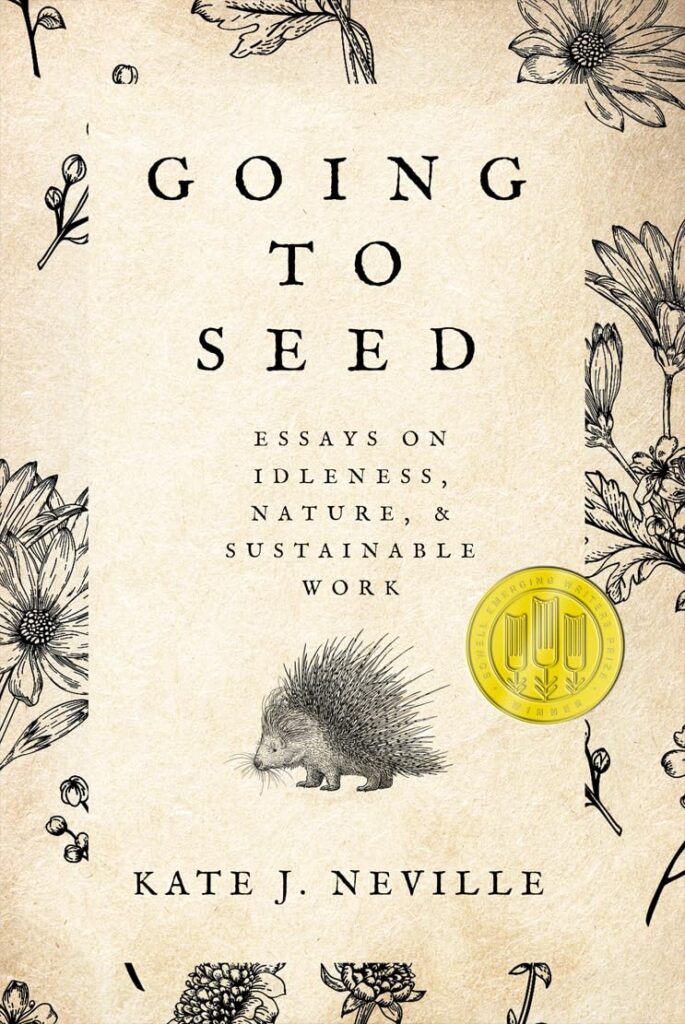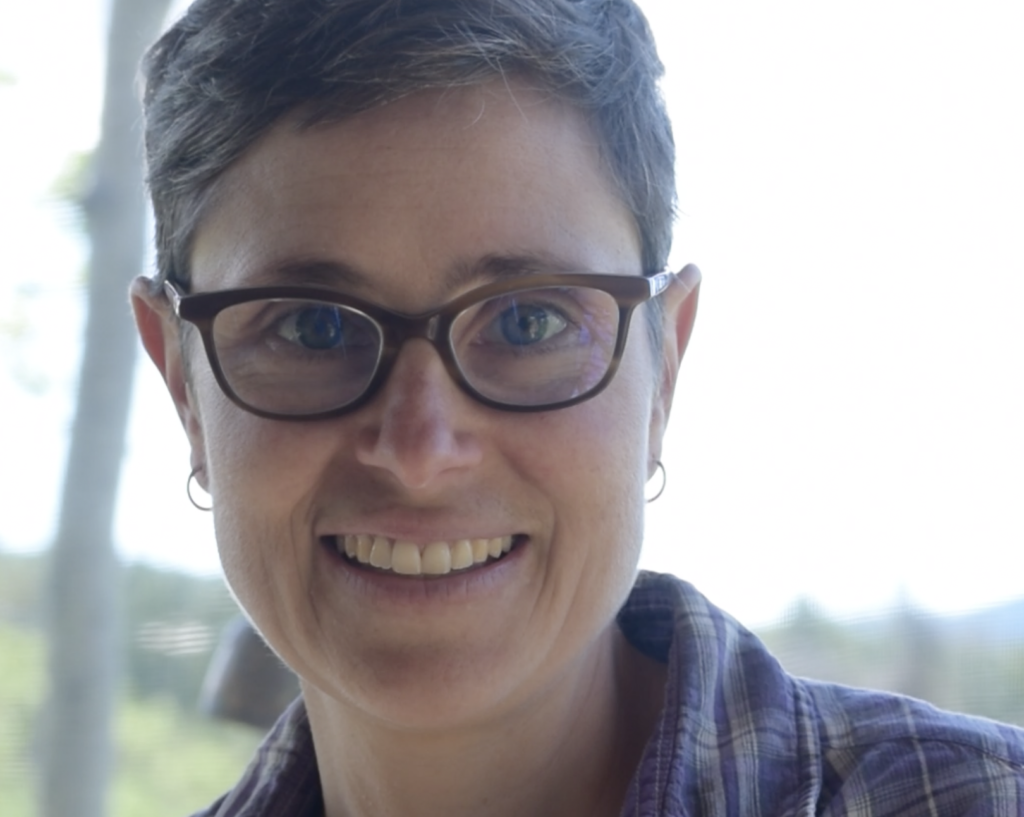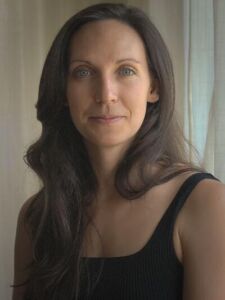Was your day productive?
Going to Seed: Essays on Idleness, Nature, & Sustainable Work
by Kate J. Neville
Regina: University of Regina Press, 2024
$30.95 / 9781779400000
Reviewed by Natalie Virginia Lang
*

Work. We all do it in some way—a necessity that dominates a large part of adulthood, and which, for some, is such a part of us that slowing down or stopping work altogether can cause great anxiety. Why is that? What is it about work culture that occupies so much of our minds? What can idleness, as a counterpoint to work, teach us about the human experience and other ways of being? Can an intentional curve toward slowness, an understanding of the coercive control (and where that control stems from) that work can have over our lives, and a practice of questioning the very vocabulary used to talk about work and idleness, help our communities imagine a more open, connected, and sustainable world, freed from the confines of a prescribed work-life experience?
In her new book, Going to Seed: Essays on Idleness, Nature & Sustainable Work, Kate J. Neville, Associate Professor in the Faculty of Arts and Science at the University of Toronto, seeks to “challenge the easy categories of work and idleness, offering instead a circumambulating look at what ideas and ideals might be needed to imagine a radically different world.” Utilizing the essay as a key form in Going to Seed, Neville has written a collection of meditations—questions, thoughts, observations—that seek not to persuade, instruct, or offer a “how-to” guide in achieving the ideal work-life balance. Rather, Neville has used the labour of writing seven essays as a “chance to reflect, and wonder, and imagine; a space to relax [her] self-assurance and invite doubt.”
Going to Seed is prefaced with an introduction that effectively situates the reader around Neville’s central thesis— consider what “being constantly occupied” does to both an individual’s quality of life and the collective health of a community, society, and natural environment. Neville argues that “whether in waged labor or in commercialized forms of leisure [there is] no space to form our own values and views and ethical judgements, and so leaves us ill-equipped to contribute to a collective social and political life.” Without this breathing room, we are rarely able to question, let alone challenge inequities or the status-quo. Instead, we fall into patterns of servility with “creeping authoritarianism” making its way into our lives. We think we understand the world and our place in it, yet we are only observing “what aligns with our expectations” and not observing a true reflection of society—a society that causes immense damage in the name of progress, with the virtue signal of hard work at the centre.
These essays are collections of philosophical questions that often circulate around stories, the telling of personal experiences, or challenge the very vocabulary we use to describe our daily activities. Neville asks readers to consider “what work is needed, when, by whom, for whom, and at whose expense” — essential queries that I must wonder how many of us have ever considered.
Idleness, Neville maintains, is a key focus in the seven wandering pieces following the introduction. In an essay titled “Grasshopper Songs: On Creativity,” Neville defines meritocracy as a myth declaring “if you’re struggling, you just need to work harder.” This statement is aggrandized in an entire system designed to keep the working class busy, and embarrassed if they can’t seem to make ends meet. In fact, “[t]he shame and stigma of not working” is so deeply entrenched in our society that we largely walk willingly into the fire, working ourselves into states of anxiety, just to participate in a succubus capitalist system that only functions when its working class works harder, longer, and for less. This rate of work leaves little time to consider the impact such a system has on us and our community, nor the impact we have on the natural environment.

Neville brings Nature into the conversation—a guidance marker we can often return to—at many points throughout her book. She explains, in “Beaver Blockades: On Resistance” that “[s]tillness is antithetical to progress, at least in colonial approaches to modern life.” The larger discussion initiated here, asks readers to question from where arose our aversion around being still or idle or meandering, and indeed the guilt and shame that comes along with stillness. These slow practices, in truth, exist throughout the natural world— dormant winters, hibernating bears, the patiently waiting cougar, and even the beaver’s methodical selection trees to build their dam—and are equally beneficial for the human mind and body. Yet, the positive aspects of stillness have been twisted by colonizing language designed to eclipse the net positive nature of those who are more idle. People who lead a slower and more intentional life are likened to vagrants. They are described as lazy, a drain on the system, non-conformers refusing to contribute to and participate in society. But what if none of this were true? What if our perception has been warped by a world that needs us to work hard to maintain an unsustainable system of oppression, domination, extraction?
Throughout her collection of essays, Neville points out that “[p]ossibilities arise from slowing down,” a notion long forgotten and often actively thwarted in colonially-dominant capitalist cultures. There is a certain amount and type of work that must be done for us to live and thrive, but how we approach that work, who does it, and why, matters. Sustainability in ourselves and what we can continue to contribute, as well as the sustainability of the environment around us that everyone depends on to continue life on earth, matters. Outsourcing undesirable work to others so that some of us can be idle, only causes further damage to society. Even the use of technology that promises to make our lives better, is a notion to be considered only if that technology leads to less work, without taking from life sustaining ecosystems, rather than better work for some and more work for others. The key here, for Neville, is that “[t]he challenges of work can also be the rewards, but only if, in the distribution of those tasks, there is fairness, autonomy, recognition, and respite.” Reaching these solutions are often a question of balance—a question of sustainability.
Going to Seed is a uniquely positioned book for our time. This is a world of converging ideas and ways of being, where nature, idleness, and the question of work can be explored as combined lessons for a better, more sustainable tomorrow; a tomorrow that is adequately liveable for all only when our current system of extraction and progression shifts into a more balanced life and work style—one which is considerate of the environment, puts value on slow thought and slow work, and takes lessons from the patient and symbiotic behaviour of all other natural life forms.
Neville’s essays do feel at times like a wander through her mind. It is this format, though, that is most exciting. It is a true embodiment of how we can live our lives—slowly, questioning the validity of our society’s expectations, and observing the world around us. So, lean in. Lean in to Neville’s questions and theories. Lean in to an alternative work life. Lean in to open possibilities for other ways of being. You might be surprised by what you find.
*

Natalie Virginia Lang is a teacher and writer. She is an alumnus of the Graduate Liberal Studies program at SFU and has contributed essays to The British Columbia Review: “Living with Oil?,” “Remnants of Sumas Mountain,” and “Letters from the Pandemic: Dear Will.” Lang is the author of Remnants: Reveries of a Mountain Dweller (Caitlin Press, 2023), a memoir inviting readers to re-examine our relationships with the natural world. [Editor’s note: Natalie Virginia Lang has reviewed books by Steven Earle, Betsy Warland, Christina Myers, Catherine McGregor and Shailoo Bedi (eds.), Rick Antonson, Dave Doroghy for The British Columbia Review.]
*
The British Columbia Review
Interim Editors, 2023-25: Trevor Marc Hughes (non-fiction), Brett Josef Grubisic (fiction)
Publisher: Richard Mackie
Formerly The Ormsby Review, The British Columbia Review is an on-line book review and journal service for BC writers and readers. The Advisory Board now consists of Jean Barman, Wade Davis, Robin Fisher, Barry Gough, Hugh Johnston, Kathy Mezei, Patricia Roy, and Graeme Wynn. Provincial Government Patron (since September 2018): Creative BC. Honorary Patron: Yosef Wosk. Scholarly Patron: SFU Graduate Liberal Studies. The British Columbia Review was founded in 2016 by Richard Mackie and Alan Twigg.
“Only connect.” – E.M. Forster
One comment on “Was your day productive?”
Thank you Natalie Virginia Lang for your compelling review of Kate J. Neville’s collection of essays which highlight the depth of our culture’s unspoken devotion to the Protestant Work Ethic – a devotion that we desparately need to overcome.